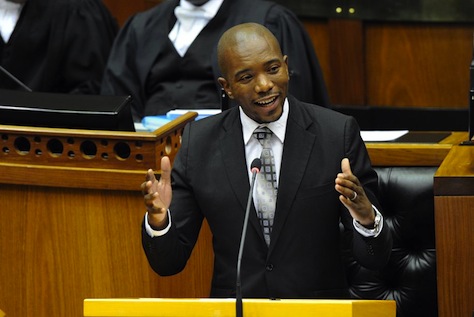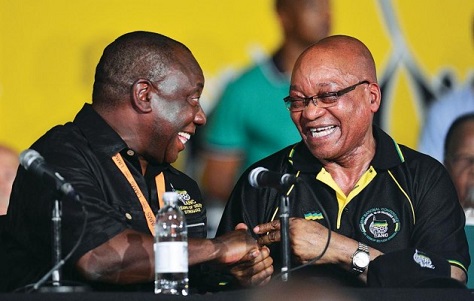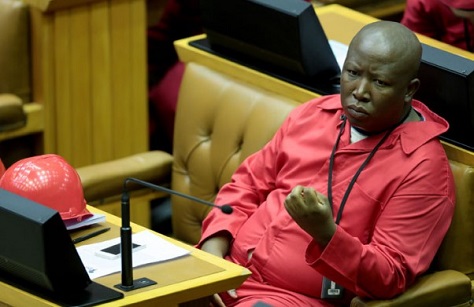 Photo credit to Lulama Zenzile / Foto24.
Photo credit to Lulama Zenzile / Foto24.
With four years to go in her second term as premier of Western Cape province, Helen Zille announced Monday that she would not go forward as the leader of South Africa’s opposition party, the Democratic Alliance (DA). ![]()
That opens the way for the DA’s parliamentary leader, Mmusi Maimane, to win the leadership in three weeks’ time at the party congress. If he wins, as is very likely, it will be the first time that a black South African will lead the country’s chief opposition party. It comes at a time when both Maimane and Julius Malema, the leader of the radical Economic Freedom Fighters (EFF), are making headlines by challenging president Jacob Zuma, whose ruling African National Congress (ANC) has dominated South African politics and governance since the end of apartheid in 1994.
At age 34, Maimane is part of the generation a bit too young to join the resistance struggle against apartheid. Nevertheless, he has consistently outperformed his party as a member of the South African National Assembly from Gauteng — the largest of South Africa’s provinces, and home to both Johannesburg, the country’s largest city, and Pretoria, its capital. In the 2014 election, Maimane won 30.8% of the vote in Gauteng to just 53.6% for the ANC, and also he performed strongly in the 2011 Johannesburg mayoral election. Strong performances alone, however, that boost the DA’s support to the 30% threshold, will not create a true two-party system in South Africa.
* * * * *
RELATED: Who is Mmusi Maimane?
Possibly the next premier of Gauteng.
RELATED: Even with victory assured, is the ANC’s future at risk?
* * * * *
In contrast to ANC propaganda that sharply denounces the Democratic Alliance as a white-dominated vehicle for post-colonial oppression, Zille was a celebrated journalist who worked to uncover the injustices of minority rule in South Africa during the 1980s and 1990s. In 2004, the Democratic Alliance won just 12.4% of the popular vote. After Zille took control of the leadership, the party won control of Western Cape province and increased the DA’s national share of the vote to 22.2% in the May 2014 general election. Nevertheless, when the ANC, under Zuma’s weak leadership, can still command over 62% of the vote, it’s clear that there’s a ceiling to the support that a party led by a white South African will command in a country where the racial nature of politics runs deep.
That doesn’t mean that Maimane’s probable ascension as the party’s next leader will solve the party’s image problem, and Maimane might be well-advised to rename and rebrand the party as his first priority if elected as its next leader. Even under the best conditions possible for the Democratic Alliance, it’s inconceivable to believe that the ANC will be dislodged in the next election in 2019 or even perhaps the 2024 election. But Maimane, whose father grew up in the notorious Soweto slum, can present a fresh contrast to an increasingly geriatric ruling class. Zuma will be 77 when his second term ends. His most likely successor, vice president Cyril Ramaphosa, is currently 62 years old, and he first seriously contested the ANC’s leadership in the late 1990s, when Thabo Mbeki edged him out for the opportunity to succeed Nelson Mandela.
Zuma’s rule has been marked by a declining economy, higher energy prices, lower commodities prices worldwide, which has left South Africans wearier than ever of its underperforming government. Though those factors are, to some degree, out of Zuma’s control, he hasn’t taken the opportunity to launch efforts at economic reform. Instead, his first term was marked by the 2012 Marikana massacre in response to mining strikes and the slow-rolling outrage over government-financed improvements to Zuma’s Nkandla home.
 Photo credit to Leon Sadiki/City Press.
Photo credit to Leon Sadiki/City Press.
In the 2017 ANC leadership race, Ramaphosa (pictured above, left, with Zuma), who left politics for a decade to become one of South Africa’s richest businessmen, is now the favorite to succeed Zuma. With a growing portfolio as vice president, Ramaphosa might even replace Zuma as South Africa’s president before Zuma’s second term formally ends. Ramaphosa will almost certainly be a more difficult target than Zuma, shadowed with corruption allegations for decades. A free-market champion, Ramaphosa could yet introduce the kind of reforms for which South Africa’s growing business and middle classes (and foreign investors) have long yearned.
In the meanwhile, it’s Malema, a former ANC Youth League leader kicked out of the ANC three years ago, who has emerged as Zuma’s sharpest critic. Since entering the National Assembly last year with his own caucus, he has savaged Zuma over Nkandla with a simple message: ‘Pay back the money.’ Malema’s EFF rests to the ANC’s far left, with plenty of racial-tinged nationalism reminiscent of the ANC’s most radical communist days of the 1960s and 1970s, in a way that often crosses the line into demagoguery.
That may explain Zuma’s most recent push for land reform that would force the breakup and sale of estates larger than 12,000 hectares, a crude way of effecting the redistribution of land that market forces haven’t yet accomplished. Recently, shortfalls in electricity have forced ‘load shedding’ — rolling blackouts and power cuts from the national utility Eskom. It makes it seem as if Zuma should be more concerned about selling off inefficient state industries rather than redistributing private land.
Zuma is also reeling from the split in the Congress of South African Trade Unions (COSATU), weakening for the first time since 1994 the ‘tripartite alliance’ among COSATU, ANC and the South African Communist Party (SACP) that’s dominated the country. COSATU’s former general secretary Zwelinzima Vavi and members of the now-expelled National Union of Metalworkers of South Africa (NUMSA), including NUMSA leader Irvin Jim.
 Photo credit to Nardus Engelbrecht/SAPA.
Photo credit to Nardus Engelbrecht/SAPA.
Today, Maimane and Malema have a vested interest in working in conjunction to attack Zuma’s administration. But it’s easier to imagine, at least within the next decade, Malema (pictured above) and his populist radicals, in alliance with Vavi and NUMSA, marching back to steal the reins of the ANC from Ramaphosa and the old guard than a duly elected Maimane-led government.
Notwithstanding Maimane’s charms, he’s still relatively inexperienced and untested, and he’s viewed as Zille’s protege more than his own man. That may be changing, however, especially after an eloquent address to the National Assembly attacking Zuma as a ‘broken man’ and chiding South Africa as a ‘broken society,’ defending multiracial and parliamentary democracy and a fairer country for all. In a speech that asked how South Africa could achieve Mandela’s vision for South Africa, Maimane sounded a statesman-like note, channeling Mandela more than any other senior figure in South Africa today, including Zille, Zuma, Ramaphosa or Malema.
It was an important moment for Maimane. But it’s far from clear that he has the tools to transform the Democratic Alliance into a political platform that can win not only white and ‘colored’ South African votes, but the votes of poorer and middle-class black South Africans that form the core of the ANC’s hold on power.